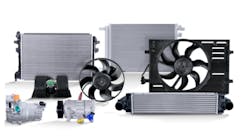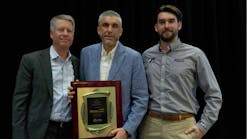Carmaker earns early victory as distributors challenge decision
In late 2006, it seemed OE vehicle manufacturers scored a victory when an administrative law judge of the U.S. International Trade Commission (ITC) ruled in favor of Ford in its suit against Keystone Automotive Industries Inc. and other aftermarket parts distributors in a case that covered patents and copyrights on OE sheet metal parts. However, the defendants plan to fight back.
The ruling, issued Dec. 4 stated that seven of ten design patents for the Ford F-150 truck were enforceable, while three were invalid because of Ford's prior public use of the designs.
Keystone and the other respondents believe the judge ruled correctly by invalidating the three patents. Therefore, distributors intend to contest portions of the ruling, leaving the situation unsettled.
The respondents filed a petition urging the Commission to review and reverse other portions of the initial determination, as well as earlier rulings by the administrative law judge. The ITC has 45 days from the date of service of the initial determination to decide whether or not it will grant, in whole or in part, a petition for review. If the petition is granted, the Commission will then set a briefing schedule.
The ruling will be reviewed by the ITC, which must issue a decision by March 5.
If the ITC upholds the court ruling, it will issue an order prohibiting further importation of the parts into the United States. The Commission's actions are subject to review by President George Bush, who has the authority to approve or disapprove the Commission's action. The ITC's final decision can then be appealed to the United States Circuit Court of Appeals for the Federal Circuit.
"We believe the decision invalidating three of Ford's patents is correct, but incomplete, and that all of the patents are invalid, unenforceable and not infringed," says Keystone President and CEO Richard Keister. "We, therefore, intend to vigorously pursue our appeal rights."
The seven patents found to be enforceable cover 13 parts sold by Keystone, which represent less than 0.1 percent of sales. It's not anticipated that the loss of these sales would be material to the financial condition or operations of Keystone, says Keister.
Ford initially charged that Keystone and the other respondents infringed 14 design patents directed to various exterior parts of Ford's 2004/2005 F-150 truck. The manufacturer dropped four design patents from the suit prior to trial.
The Commission's Office of Unfair Import Investigations, an independent party representing public interest, supports Keystone and the other respondents on all issues, including their position that the patents are invalid — not infringed — and unenforceable.
The collision repair parts market is a $16 billion industry, estimated to be 72 percent controlled by automobile manufacturers. The utilization of aftermarket parts represents an estimated 20 percent to 40 percent savings over parts supplied by the manufacturers, according to Keystone.
Depending on the final outcome of the case Ford and other automobile manufacturers may attempt to assert similar allegations based upon design patents on a significant number of parts for other models. Ultimately this could impact parts supplied throughout the collision repair industry.
If the courts uphold the rulings in favor of Ford, hundreds of copyright patents likely will be filed by Ford and other OEs to protect their design rights and patent positions on sheet metal for new vehicles.
Another case
In a complaint filed in the Federal District Court for the Eastern District of Michigan on Dec. 1, MQVP Inc. asserts that Keystone violated MQVP's registered trademarks by distributing parts outside of the MQVP program.
Keystone is in the process of reviewing the lawsuit.
"Based on our evaluation to date, Keystone does not believe it has any liability to MQVP," says Keister. "Should any liability be determined, we do not believe it would have a material impact to the company's financial position."
MQVP alleges that Keystone distributed non-MQVP-approved parts, used MQVP's service mark without permission and traded on the goodwill of MQVP and its service mark in a way that confused the public. Based on these allegations, MQVP is seeking at least $20 million in damages and equitable relief, according the suit.
Keystone had been a qualified participant in the MQVP program from its inception in 2003 until it voluntarily withdrew in November 2006.
"The quality and integrity of Keystone's Platinum Plus parts are most important and fundamental to our business," says Keister. "We stand behind all of our parts with the most comprehensive warranty in the aftermarket collision replacement parts industry."


